

Sponsored by




Sponsored by

In 2024, I have been working on significant reform in the areas of defamation law and gambling regulation in Ireland. These laws will be progressed when Oireachtas business resumes in autumn 2024. Minister of State with responsibility for International Law, Law Reform and Youth Justice, James Browne TD, writes.
These initiatives are part of a broader government commitment to safeguarding public welfare and protecting the vulnerable, to enhancing access to justice, and strengthening our democracy by promoting reasoned debate and discussion within our public realm.
These laws will secure a delicate balance of preserving individual freedoms while establishing robust protections against harm.
The new Defamation (Amendment) Bill 2024 is a big step forward in updating Ireland’s defamation laws to fit today’s fast-paced media environment.
For the average person, if someone harms your reputation, this Bill will make it easier, quicker, and less expensive to get justice. It balances the right to free speech with the need to protect a person’s good name, ensuring that you can defend your reputation without the
lengthy and costly processes that might have held you back before.
In addition to these changes, the Bill promotes alternative dispute resolution mechanisms. This will encourage prompt corrections and apologies, when warranted, aiming to resolve disputes amicably and cost-effectively. This approach not only avoids the need for court proceedings, but also fosters a more conciliatory environment for addressing genuine grievances and errors.
The abolition of juries in High Court defamation cases is designed to reduce unpredictable and at times disproportionate damages awards.
In developing this Bill, I was conscious that we must strike an appropriate balance to ensure that costs, risks, and outcomes in defamation proceedings are more proportionate and less uncertain. This is important both to improve access to justice generally, and to avoid any chilling effect of defamation
proceedings on the freedom of the press.
The proposed changes are intended to streamline legal processes, curtail excessive legal costs, and speed up resolution of disputes.
The Bill also introduces measures to combat strategic lawsuits against public participation (SLAPPs). These lawsuits, often used to muzzle journalistic endeavours and silence critics, pose a significant threat to democratic discourse and press freedom.
By implementing protections against SLAPPs, the Bill not only supports investigative journalism but also fortifies democratic principles by ensuring that matters of public interest can be freely explored and debated.
Establishing a gambling regulator
The Gambling Regulation Bill 2022 is designed to protect consumers by creating a comprehensive regulatory
framework for gambling which will address the complexity of the modern gambling industry, particularly the rise of online betting, accessible 24/7 via smartphones.
Every person, including children, now carry a mobile casino in their pocket. This ease of access has led to increased problem gambling, especially amongst younger users.
The anonymity and global reach of online platforms make it harder to prevent problems like addiction and illegal activities such as money laundering. The establishment of a new Gambling Regulatory Authority of Ireland is core to the Government’s commitment to ensuring robust safeguards are in place to protect public safety and wellbeing in this rapidly evolving landscape. It will mark a significant shift from outdated regulations to a robust, modern oversight mechanism.
The core objectives of the new regulator include preventing gamblingrelated crimes, ensuring fair and transparent gambling practices, and promoting responsible gambling to combat addiction. The new regulator will have the power to regulate both online and in-person gambling, manage advertising standards, and enforce compliance among operators.
One of the most noteworthy aspects of the Bill is its focus on protecting vulnerable individuals, particularly children, from the risks associated with gambling.
Measures such as prohibiting gambling advertisements that appeal to minors, banning the use of credit cards for gambling, and establishing a National Gambling Exclusion Register are pivotal in mitigating the potential harms of gambling addiction.
The Social Impact Fund, financed by industry contributions, will further support research, awareness campaigns, and treatment programs for problem gambling, ensuring a comprehensive approach to public health and safety.
Both legislative initiatives reflect a careful balancing act between upholding individual rights and instituting necessary protections.

“The reforms being put into effect seek to create a fairer, safer society where justice is accessible, rights are respected, and vulnerable individuals are protected from harm.”
Minister of State with responsibility for International Law, Law Reform and Youth Justice, James Browne TD
In the case of defamation reform, the emphasis is on fostering an environment where freedom of expression and the protection of reputations can coexist and operate in unison.
For gambling regulation, my focus has been on creating a safe gambling environment, recognising the industry’s economic significance while at the same time being alive to the social challenges it presents.
The policy decisions I have made in these areas stem from a belief in the importance of proportionality and transparency in legislative reforms. These bills, shaped by extensive public and stakeholder consultation and careful consideration, aim to address the specific risks associated with defamation and gambling. By doing so, the reforms being put into effect seek to create a fairer, safer society where justice is accessible, rights are
respected, and vulnerable individuals are protected from harm.
Ultimately, the success of these reforms will be measured by their ability to enhance public trust, support responsible behaviours, and uphold the rights and protections essential to a just society.
Both the defamation and gambling regulation bills are necessary to keep pace with the rapid technological changes that have transformed how we communicate, are influenced and behave. These reforms are designed to address the new challenges and risks that have emerged in our increasingly digital world, ensuring that our laws remain relevant and effective.
As the legislative process continues, I look forward to working with my colleagues to aid the passing of these significant and worthwhile updates to the statute book.

Innovation has the potential to enhance efficiency, improve access to justice, and ensure greater transparency within legal processes. However, realising these benefits requires more than just adopting new tools; it demands careful planning, thoughtful user-centric design, and a robust architectural approach. Without a solid foundation, robust design and compliance, the implementation of these technologies may fall short, leading to missed opportunities for meaningful reform.
There are many opportunities for AI in the justice sector including AI-powered video analytics which can enhance crime prevention, suspect identification, and cross-border security through facial recognition, the tracking of individuals, and object detection.
Additionally, AI can prioritise law enforcement responses by assessing threat levels using algorithmic scores, streamline judicial processes, and can also support rescue and disaster responses by analysing imagery, locating individuals, and assessing damage. Law enforcement can also benefit from integrated intelligence analysis platforms which display crime trends and allow for rapid searches exploring potential criminal relationships.
The adoption of digital and exponential technologies, such as artificial intelligence and big data analytics, holds great promise for transforming the justice sector, writes Cillian Leonowicz, Partner and Head of the Strategy and Architecture team in Technology Transformation, EY Ireland.
There are numerous case examples of AI applications in the justice sector:
• SIGMA- Centralised AI-Driven Drafting and Decision Support for Judicial Efficiency (Brazil). The Federal Appeals Court in Brazil has implemented an AI system known as SIGMA. This program centralises draft models related to conformity and appeal admissibility judgements, assists in preparing legal reports, and aids in making decision and judgements within the Electronic Judicial process systems. SIGMA is available 24/7 and has significantly reduced case processing time.
• AI-Driven Preventive and Predictive Policing (India): The State of Karnataka has adopted AI-enabled policing through the installation of 7,500 surveillance cameras. AI integrates with police databases to detect suspicious behaviour and vulnerable areas via facial recognition. AI also uses historical data to anticipate criminal activities, enabling the pre-emptive deployment of officers to potential crime locations.
2. Detection, monitoring, and positioning systems
Law enforcement agencies are increasingly relying on detection, monitoring, and positioning systems to proactively address criminal activities and enhance public safety. These technologies allow for real-time data collection and analysis, enabling law enforcement to respond swiftly and effectively. For example:
• Drones: provide critical aerial surveillance capabilities. Police Forces across the globe have deployed drones for aerial surveillance and criminal activity detection including the Metropolitan Police Service in London.
• Global Positioning System (GPS): GPS technology improves the tactical deployment of police resources, improving coverage and better decision-making.
• Licence Plate Scanning: Automatic licence plate recognition (ALPR) systems allow for the immediate identification of vehicles associated with criminal activity. Additionally, ALPR is employed for road safety by detecting vehicles with expired registrations or those involved in traffic violations. These have been deployed here in Ireland by An Garda Síochána.
• Traffic Management System (TMS): New Zealand’s TMS excels in realtime adaptation to traffic conditions and unexpected events. Utilising real-time data, TMS can quickly respond to accidents, road closures, and adverse weather by adjusting signal timings and rerouting traffic to minimise disruptions and congestion.
As the volume of digital evidence collected by law enforcement continues
to grow, the need for efficient and secure management systems has become more critical. The implementation of a Digital Evidence Management Systems (DEMS) streamlines evidence gathering, eliminating manual logging into multiple systems and enhances transparency and accountability in law enforcement.
DEMS provide security measures including redundant storage options that can be both on-site and cloud based. These storage solutions can also be expanded when needed offering scalability and flexibility. In addition, as the use of body worn cameras (BWC) becomes more widespread, a smooth integration with DEMS is crucial.
All digital evidence, including videos from BWCs, security cameras, and other digital sources, may be controlled and stored in one place because of the integration. DEMS also provides a clear and detailed chain of custody which is essential for the integrity of digital evidence. DEMS monitors all digital file interactions, such as who accessed the evidence, when it was accessed, downloaded, shared, and for what purpose. This ensures that all digital evidence maintains its integrity throughout the judicial process.
In addition to the foregoing technologies, we have also seen digital and exponential technologies like blockchain being used to secure and verify digital evidence, ensuring tamper-proof records and enhancing trust in the legal process.
During the Covid pandemic, we saw the deployment by the Court Service of remote court proceedings. In many jurisdictions, virtual courtrooms and remote hearings, driven by advancements in video conferencing technology, are becoming standard practice, increasing accessibility to justice while reducing costs and delays.
All these technologies will play a significant part in shaping the future provision of justice. So, how do we truly realise the benefits of them?
To truly realise the benefits of these new and exciting technologies we need to:
1. Reimagine and reengineer with Humans@Centre
We need to think about how we want justice and associated services to be delivered and consumed by

“Without a solid foundation, robust design and compliance, the implementation of [innovative] technologies may fall short, leading to missed opportunities for meaningful reform.”
Cillian Leonowicz, Partner and Head of Strategy
individuals. If we want streamlined, efficient, and effective service we need implementation which is empathetic and sympathetic to user needs and their expectations, for example those who are digitally native. Moreover, we need to be pragmatic in the prioritised deployment of these new processes and services to move beyond ‘pilots’ and into ‘production’ to deliver measurable impact and value.
We need to ensure that all new processes, services, and technologies delivered are both secure and compliant by design. Heightened data privacy and the acute need for increased cybersecurity must be considered from day one. Retrofitting is expensive, fraught with risk and will slow down deployment and benefit realisation.
3. Architect as an ecosystem
The provision of justice following an event is a cross-organisation activity. For example, a single criminal case may involve police, courts, judiciary, prison services,
EY Ireland
and health services, as well as legal professionals, public prosecution and insurance firms. To benefit from new exponential technologies, we must consider integrated customer or user journeys as well as the safe and compliant sharing of data to enable processes and service delivery. Siloed thinking will not allow for the full realisation of benefits and the delivery of optimal value of new capabilities and technologies.
We have new enabling technologies that can rapidly transform the justice sector. The catalyst and enabler for ultimate benefit realisation and the delivery of new and enhanced services will be your collaboration and cooperation.
To find out how EY can help you: W: ey.com/ie/consulting
An tSeirbhís Chúirteanna – the Courts Service hosted a round table discussion in its Phoenix House headquarters, Dublin, inviting civic society stakeholders from across the courts system to discuss inclusive digital transformation and lessons for the wider public service.
In an era of increasing digitalisation, how has your organisation developed its range of services?
Angela Denning
Four or five years ago, the Courts Service had 140 different IT systems which made any attempt to simplify or streamline our services very difficult. Many of these systems were obsolete. Our focus is to establish a single unified case management system with three interfaces: the staff view, the public user view, and the judicial view. The first application was rolled out to staff to support the administration associated with the Assisted DecisionMaking (Capacity) Act 2015. In 2023,
we moved High Court civil work onto the new system, replacing a 30-yearold case management system. A phased rollout of the system to support family law work in Circuit Court offices is underway and we are making good progress with the eProbate project. However, we do not envisage a ‘digital only’ system. As the Courts Service digitises, that should take pressure off frontline staff in public offices allowing more time to support those with limited digital literacy. We also continue to invest significant effort in using plain English information on our website and in the design of new court forms. In a vote of confidence, the Citizens Information website has a link to the family law website – which, in June
Round table discussion hosted by


2024, won a Civil Service Excellence and Innovation Award for citizen impact and customer service. The ambition is to replicate this success across every type of law and jurisdiction.
Colleen Dube
NALA is a registered charity and membership-based organisation that supports and advocates for individuals with unmet literacy needs. Since 2008, NALA has been offering distance and eLearning services. Coincidentally, in the month when public health restrictions for Covid came into effect in Ireland, we launched Learn with NALA, a new eLearning system. It was a ‘lifeline’ for people and organisations –such as education and training boards – which had to immediately pivot online. Our user profile changed substantially. Alongside people with unmet literacy needs, we supported many older people to develop their digital literacy skills, as well as special schools and disability services which availed of our services. In recent years, a considerable proportion of our work
has been devoted to developing Learn with NALA, incorporating universal design, involving users to improve the platform, and trying to stay ahead of the curve in terms of accessibility. Overall, I spend a considerable amount of time engaging with government and public service providers to emphasise that we must adopt a ‘digital and’ approach to public services rather than ‘digital only’.
Aideen Hartney
During the Covid pandemic, the migration of many public services from in-person to remote delivery was incredibly significant for disabled people. For many, this development increased their access to services. A second catalyst has been the UN Convention on the Rights of Persons with Disabilities (UN CRPD) which Ireland ratified in 2018. Since then, there has been a steadily increasing focus on realising the rights of disabled people. In this context, public services cannot be ‘digital only’. However, if we adopt a universal design approach, the digital approach will also serve the maximum number of users. Typically, state agencies have focused on the middle of the bell curve in an attempt to achieve maximum return for minimum investment. However, when we design for extreme users – at either end of the curve – we can increase accessibility to as many people as possible. While ‘digital first’ is an important concept, it must be applied in tandem with ‘inclusion first’.
Dympna Kenny
Victim Support at Court is a volunteerled, in-person service provided within the courts. 80 per cent of our victims’ referrals are from An Garda Síochána. We have significant work to do in relation to digital and providing information in an accessible way prior to a victim’s arrival in court. Currently, we are finalising our three-year strategy which will include a comprehensive review of our digital footprint. Given that we do not have a significant budget, we must determine how we can maximise our digital offering to provide support to victims attending court.
Mary Murphy
Getting Started is one of Age Action Ireland’s two main services and is focused on developing the digital skills of older persons. Learner-led, it is about determining what a person’s

Angela Denning was appointed Chief Executive Officer of the Courts Service in September 2019 having spent most of her career working in court operations. The Courts Service is an independent agency established to manage the courts and court buildings, provide support services for judges, provide information the courts system to the public, and provide facilities for court users. Denning is responsible for delivery of the Service’s ambitious 10-year Modernisation Programme which commenced in 2020 and seeks to improve access to justice in a modern, digital Ireland.

Colleen Dube has been Chief Executive Officer of the National Adult Literacy Agency (NALA) since November 2020. A focus of her work over the last four years has been collaborating with SOLAS on the development and implementation of the Adult Literacy for Life Strategy. In addition she has been engaged in financial inclusion and literacy research and policy development. Prior to joining NALA, she was Chief Executive Officer of Uversity, a Registered Charity that awards higher education scholarships to adult learners.



Aideen Hartney became Director (Chief Executive) of the National Disability Authority (NDA) in mid-2020, having joined the organisation in 2016 as its Head of Policy, Research and Public Affairs. The National Disability Authority is the independent statutory body, which provides evidence-based advice and research to Government on disability policy and practice and promotes Universal Design. Hartney has had a lengthy career in overseeing research for the public good, having managed several major funded research programmes in University College Dublin, before coming to the NDA. She also has private sector experience following seven years as a market research consultant.
Dympna Kenny has led, motivated, and managed teams of assorted sizes in the private and charity sector for over 30 years. She has brought this experience into her role as General Manager with Victim Support at Court (V-SAC), which provides free and confidential court accompaniment and support for victims of all types of crime when they attend court. Since Kenny joined V-SAC in 2016, the organisation has expanded its service from a Dublin base into a national court-based victim support organisation.

Mary Murphy is the policy analyst at Age Action, an advocacy organisation that promotes the rights and equality of all of us as we age. As older persons live and work in all areas of society, Age Action works across a broad range of topics, including social inclusion, age friendly workplaces, life-long learning, digitalisation of services, and ageism. Its work is founded on qualitative and quantitative research, international best practice, and ongoing engagement with older persons.

“As the Courts Service digitises, that should take pressure off frontline staff in public offices allowing more time to support those with limited digital literacy.” Angela Denning

needs and priorities are. Getting Started acknowledges that there are many reasons for people having gaps in their digital skills and the varied nature of these gaps. Roughly onethird of people aged 65 exited formal education at primary level and another third at secondary level. Consequently, there are significant literacy challenges among older cohorts. At the same time, cognitive decline can make interaction with complex systems more difficult. However, we also acknowledge that digitalisation and digital literacy are not fixed points. Since Covid, we have revised our mode of teaching – and our ethos – reorientating towards basic functional skills to facilitate problem solving. This can more be difficult and more involved, but it unlocks greater value in the longer term. Ultimately, not everyone is going to avail of digital services – whether through digital literacy gaps or the absence of resources to afford the devices. As such, digital skills are not the sole solution to digital exclusion.
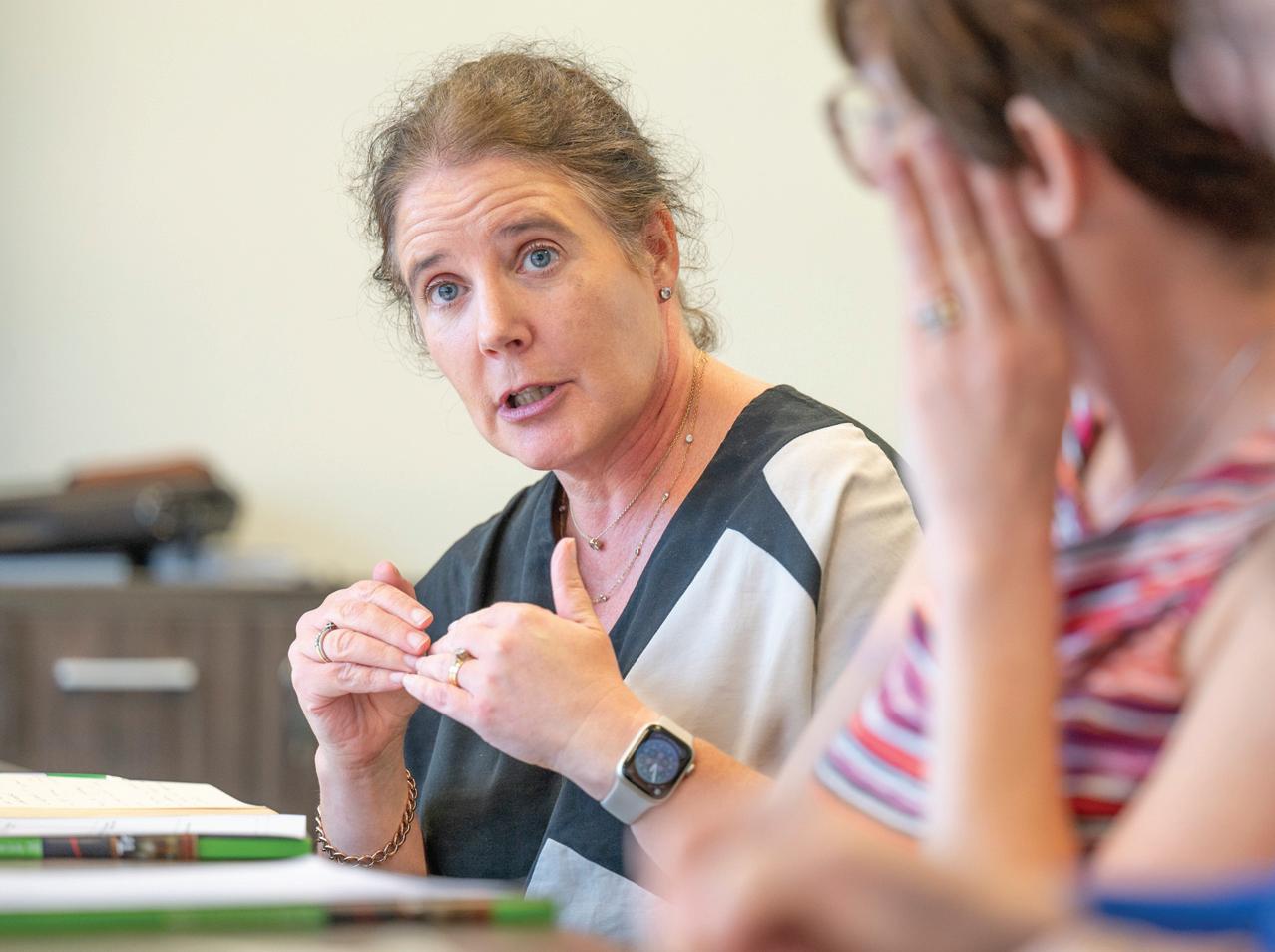
“When we design for extreme users – at either end of the curve – we can increase accessibility to as many people as possible...” Aideen Hartney
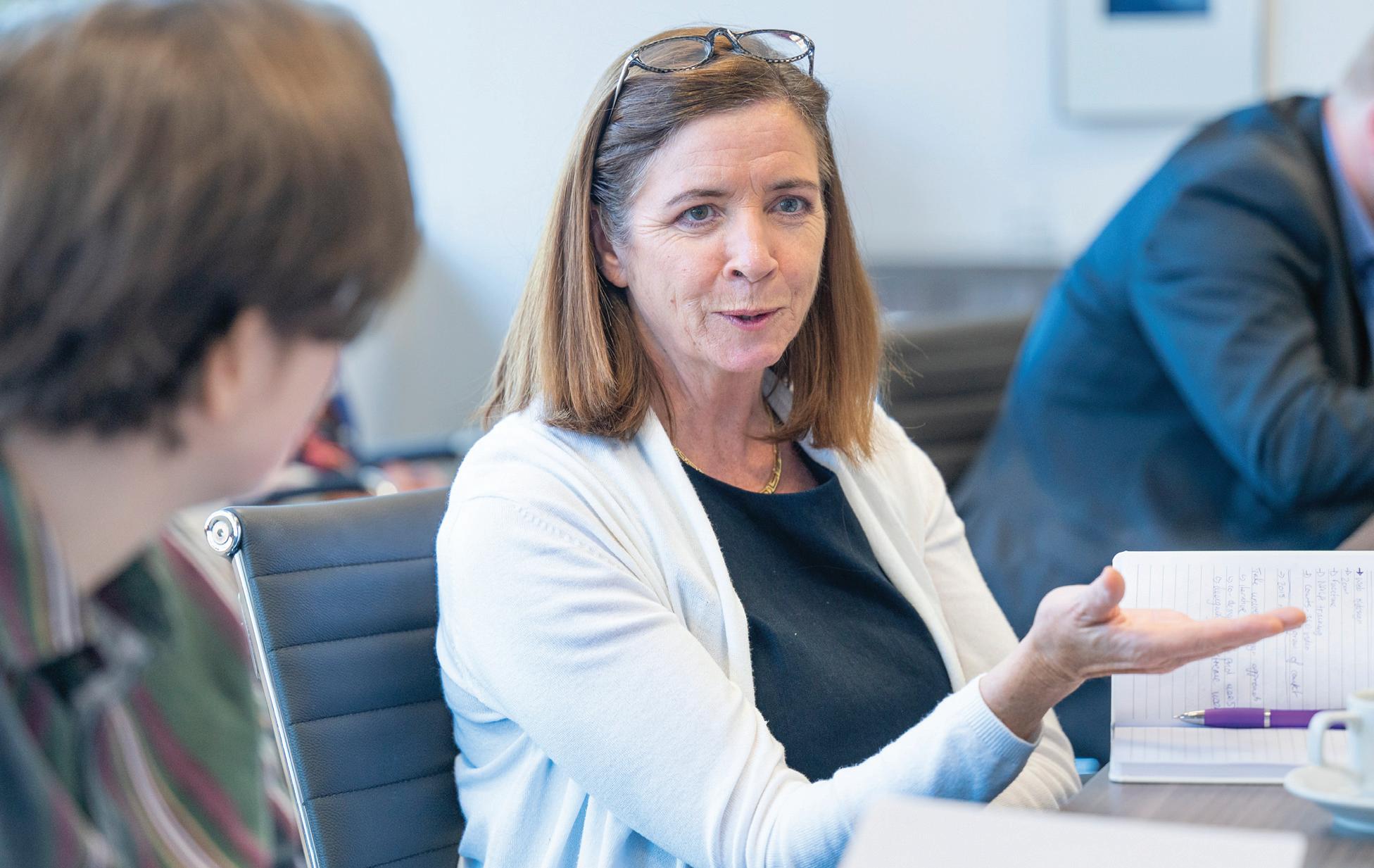
How have your stakeholders’ expectations of the Courts Service evolved?
Aideen Hartney
European legislation means we have new legal obligations. As per the EU Web Accessibility Directive, all public service websites and apps are supposed to be fully accessible. In this context, we must ensure that all digital developments delivered by the Courts Service are accessible for disabled users. The National Disability Authority has the statutory monitoring duty for the Directive. Having assessed progress over the last few years, there is a considerable road to travel for most state-affiliated entities. It is encouraging to hear that the Courts Service is working on an IT strategy and that accessibility is a priority.
Simultaneously, the EU Accessibility Act, which was recently transposed into Irish legislation, aims to ensure that products and services on offer in the State are accessible and will come into effect from June 2025.
Angela Denning
The Courts Service website is undergoing an overhaul, and progress is being made, particularly with elements such as new easy to understand content on family law, civil debt and Probate. We have been using external partners to test sites to ensure

that everything is accessible, but it is a real challenge. Legal terminology has a particular meaning because we are a common law jurisdiction, and it can be difficult to always use plain English. In terms of expectations, the civil service delivered for people during Covid-19, and I think the success of the Pandemic Unemployment Payment (PUP), for example, increased expectations exponentially. The difference was that due to the emergency nature of Covid-19, much of the usual scrutiny was circumvented amid the need for agility. We were able to get remote courts up and running in a very short space of time. They are not perfect. We must make changes and make them easier to access. We are also very conscious that whatever we roll out must be accessible via any type of mobile device, including with poor connectivity. We cannot exclude people for having a device which is 10 years old, or where they live geographically. That is the challenge; it is about meeting the expectations to improve accessibility for all of our people.
Colleen Dube
Stakeholders’ expectations can be described as ones of urgency, immediacy, efficiency and accessibility. Other essential considerations are security and confidentiality that influence the public’s support and trust. Some people do not want to engage online for understandable reasons, such as cyber threat, but also because of a
lack of confidence in their skills and connectivity.
Mary Murphy
‘Expectations’ is the key word in this conversation because people’s expectations of public services are high. But when I engage with older persons from a digitalisation perspective, there is also an expectation that there will always be an office they can walk into, a phone number they can call, and a human available they can talk to. However, many older people feel a sense of betrayal and are under the impression that a social contract is being broken by the acceleration of digital only services. Another factor is the specificity of people’s situations and the individual complexity of cases. For example, if a person finds themselves in a complex situation relating to tax, they want to speak with a person at Revenue rather than just relying on FAQs on a website. This expectation applies equally to the Courts Service. Things like family law are exceptionally complicated and even the bestdesigned website cannot account for every single scenario in which someone may find themselves. These challenges can only be addressed where public 4
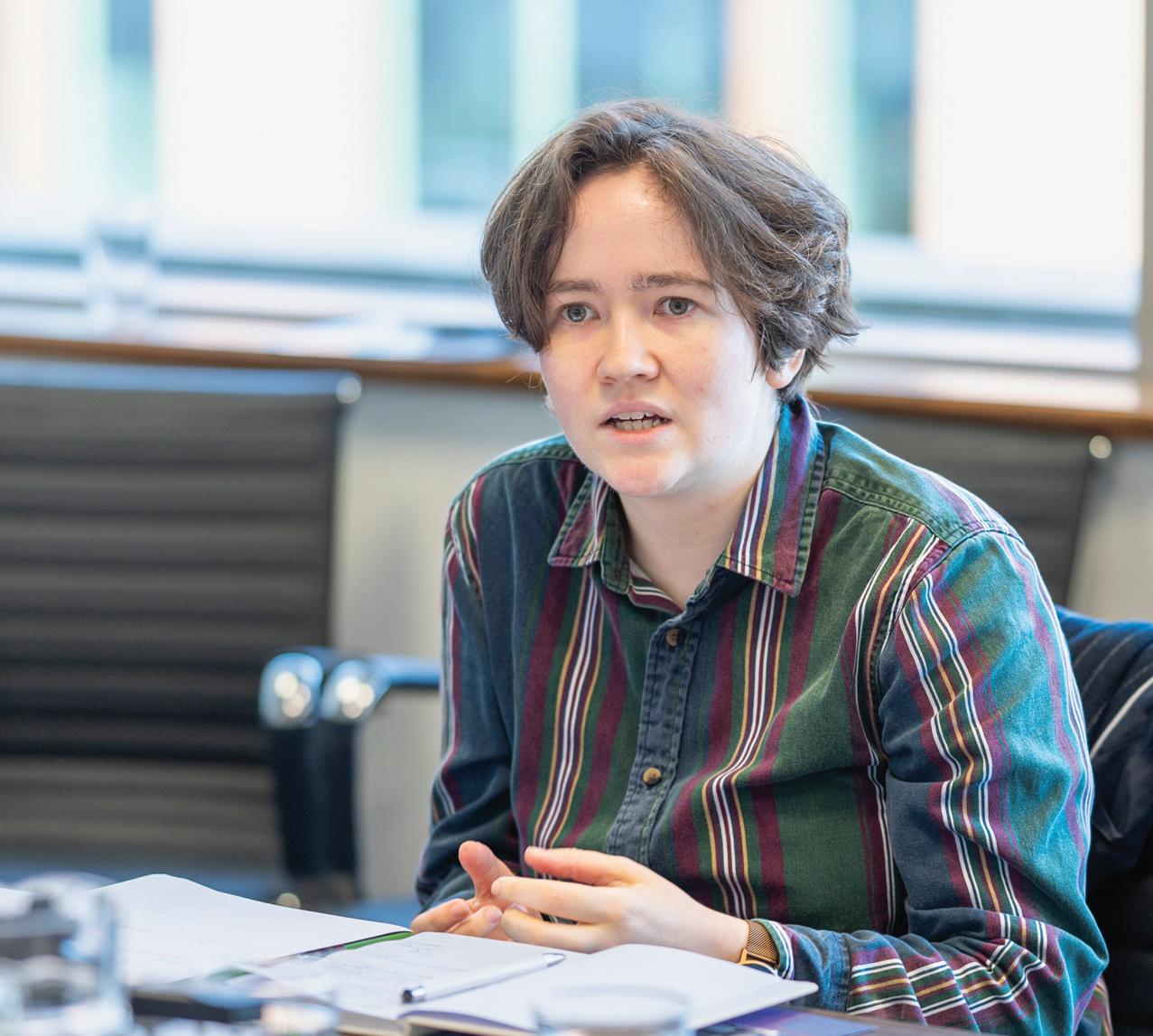
“‘Expectations’ is the key word in this conversation because people’s expectations of public services are high.” Mary Murphy
servants are available and equipped with the necessary expertise to guide people through a particular situation. As such, we must ensure that the human element of public service is never lost.
From our perspective, in supporting victims, it is about practicality. What victims need when they go to court is very pragmatic. Having information on the Courts Service website about each court and how to get there is hugely helpful. Consider, for instance, a victim who has never been to court before. Often, Victim Support at Court meets victims for a pre-trial visit. However, victims do not always get referred to us. Therefore, it is vitally important to ensure that the necessary information, including a point of contact, is in place for each court. Having a platform in the court building itself to signpost the victim to support services could be useful as victims often return to court multiple times throughout a trial.

What is the significance of collaboration among stakeholders of the Courts Service in overcoming the challenges of digitalisation?
Dympna Kenny
From a courts system perspective, it is really important to engage with all the stakeholders to make sure that its digital ambitions work for people. Not all the solutions to the challenges we face today are digital. From a digital perspective, collaborating and having discussions like this one are extremely important, and getting the right people around the table means that everyone is engaged and represented as we drive forward change.
Mary Murphy
What we all need to remember is that inclusive digitalisation is not a niche or siloed challenge. It is a challenge which extends throughout the justice sector, the public service, and wider society. It is important for me, as someone who advocates for older persons, to make that point because we need to underline the urgency of this challenge. It affects so many different people and we need to avoid stereotypes. Collaboration, therefore, is about
understanding the dynamic and nuanced nature of the change taking place.
Within the Courts Service, we engage with people from all walks of life, regardless of age, ability, race, religion, and so on. We must always remember that and be equipped to provide for everyone. As such, the value of this kind of collaboration is fundamental to how we adapt. As we recruit new talent, we have a predominant focus on customer service. This is why we now seek applicants who have a career history in customer service roles. Having people with the skills – including high emotional intelligence – to interact with vulnerable people is important because it changes the entire dynamic of how we deliver our services for the better.
There is an opportunity for the Courts Service to collaborate with many organisations, including people who have experience of the process and are willing to volunteer. What we need to determine is whether the broader public service is aware of the work that the Courts Service is undertaking. Informed by a robust evidence base, the Courts Service is a model which can be learned from and replicated. The value will emanate from how we capture this evidence, profile it, learn from it, and apply it. People need to see evidence which demonstrates how a change has worked. We know that this has happened already in the Courts Service. Now we must capture this change and share it.
Collaboration is a hugely important aspect of effecting change, be that with end-users or with other stakeholders. With the UN Convention on the Rights of Persons with Disabilities, this is now a process which stakeholders expect; they expect to be consulted and involved through the design process of a service, a policy, or a product. To date there has been a tendency across public services to consider disability in a siloed context, but one-in-five Irish people have a disability and ensuring that disabled people are included cannot be achieved without collaboration. Observing and sharing examples of good practice is a hugely important and motivating component of this.

“Informed by a robust evidence base, the Courts Service is a model which can be learned from and replicated.” Colleen Dube
How can public trust be retained and developed as the Courts Service implements more digital solutions?
Colleen Dube
Transparency and participation unlock trust. We have talked about making services inclusive and secure, but there is also an element of making people aware of the work that is being undertaken so that they can realise that the Courts Service is committed to public service. I know the Courts Service is exhibiting the levels of integrity, empathy, and transparency which are critical in maintaining public

trust. However, in my experience, ambition must be managed. Expectations on the public service are colossal and they cannot all be met all of the time. Given the finite resources and the wide variety of stakeholders, it is necessary to determine the priority initiatives that will make a difference, concentrate on them, and bring people on the journey. This builds trust and attracts more people to join the journey.
Dympna Kenny
Sharing successes is equally important. There are many challenges from the Courts Service’s perspective, but it must also demonstrate that public voices are being heard and expectations are being met. Angela

mentioned the Courts Service Modernisation Programme. Obviously, the stakeholders in this room are aware of that programme, but it is equally important that the public understands that the Courts Service is working towards enhanced access to justice and better responding to the needs of court users.
Aideen has talked about expectations around coproduction and public involvement. That process has the effect of cultivating trust through a sense of ownership among the public; that public services are of them, for them, and designed with them in mind. It can be easy to focus on people who are not as especially marginalised or disadvantaged, but trust can become much trickier when considering people who have been over criminalised and have experienced the adversarial side to the courts system. The idea of developing trust with those cohorts of people requires a more comprehensive transformation.
Established in 2022, the Courts Service Inclusion Group has been undertaking work with marginalised communities –such as refugee communities. Here in Smithfield, Dublin, we are surrounded by DEIS schools, yet many local people do not know about the civil service career opportunities available to them within the Courts Service. One of our statutory obligations is to provide information about the courts system. To achieve this, we must reach more marginalised groups, this in turn builds trust.
Aideen Hartney
There are two strands to building trust. Transparency and tone from the topdown is a significant first step, and there is a consensus in this room about how this leadership should trickle down the organisation. Secondly, there are mechanisms which support transparency and tone, such as procurement. If public service bodies can procure goods and services with inclusion in mind from the outset, it makes building public trust much easier. Inclusion should be one of the criterion upon which public service bodies, such as the Courts Service evaluates its tenders.

Under Justice Plan 2024, published in July 2024, the Department of Justice is aiming to establish several new state bodies and ensure passage of flagship legislation.
Justice Plan 2024 – the fourth such publication since the Department of Justice began publishing annual plans in 2021 – identifies five broad goals and the associated objectives to be addressed by the Department throughout 2024.
The five broad goals are:
1. maintaining a safe and secure Ireland;
2. improving access to justice for all;
3. delivering a fair immigration system;
4. strengthening influence in Europe; and
5. investing in people to deliver excellence.
The Department states that it recognises that access to justice is a “fundamental principle of fairness” and aims to implement “the reforms
necessary to deliver a faster and more effective justice system”, with a focus on creating clearer and more concise decision-making timelines.
The Department is aiming to aid the establishment of an independent mediation council as provided for in the Mediation Act 2017.
To achieve this, the Department states that it will support a review of the relevant provisions within the 2017 Act and will support the sector in its work to prepare draft codes of practice, a draft register of mediators, and to identify public interest members of the council.
The Department will consult with a working group to advise the Minister for Justice on appropriate indexation rates for Periodic Payment Orders.
The Department will also contribute to the passing of both primary and secondary legislation to permit the Minister to set indexation rates for such orders.
Upon reviewing the Legal Services Regulatory Authority (LSRA) report, the Department aims to “consider the current barriers” to becoming a solicitor or barrister in Ireland.
In doing so, the Department says it will engage with the LSRA and other relevant stakeholders “as required” to progress necessary reforms in this area.
The Department states that it will seek to establish the JAC, including appointing a director, lay members, and staff, and collaborating with the Public Appointments Service (PAS) to advertise appointments.
Oversee and monitor the implementation of the Judicial Planning Working Group’s recommendations:
The Department states it will present the Judicial Planning Working Group’s recommendations to the Cabinet and oversee their implementation. It will also examine the role and powers of court presidents and quasi-judicial officers, support the piloting of the staggered vacation scheme in the High Court (which commenced in July 2024), and provide the Government with an update on the impact of the additional judges and other key efficiency measures.
In doing so, the Department has committed to convening regular Stakeholder Engagement Group meetings.
The Department will provide programme management services to aid the establishment of the gambling regulatory authority of Ireland, enact the Gambling Regulation Bill, and appoint authority members.
The Gambling Regulation Bill was passed by the Dáil in May 2024 and is currently at Committee Stage before the Seanad.
The Department states it will “work alongside PAS to appoint three new Data Protection commissioners”, with a timeline target of Q4 2024 for this action to be completed.
“This plan will deliver on the goals and objectives as set out in the new A safe, fair and inclusive Ireland: Statement of Strategy 2024-2026.”
The Department of Justice states that, by Q3 2024, it will “support work towards” enactment of the Family Courts Bill 2022 which provides for the creation of new dedicated family courts within the existing court structures.
Minister for Justice Helen McEntee TD states: “This work will continue to make significant steps towards reforming the family justice system as committed to by the Programme for Government.”
The 2024 plan aims to make “significant progress” in updating Ireland’s defamation laws. This includes the publication of the Defamation (Amendment) Bill which follows the publication of the General Scheme in 2023.
Minister of State for Law Reform at the Department of Justice, James Browne TD, says: “This is a significant priority for Government, to reform defamation law to ensure a balanced approach between the rights to freedom of expression, to protection of good name, and to access to justice. I hope to significantly progress during 2024.”
The Department published the Bill in July 2024, although it is unclear whether the legislation will be enacted before dissolution of the current Dáil.
Through the targeted actions, the Department states that it aims to “substantially improve” public confidence in the justice system and ensure that it is more accessible and responsive to the needs of all citizens. In combination with the other broad goals as stated in the plan, the Department outlines its goal to usher in widespread reform and modernisation of the national legal system.
Remarking on the publication of the most recent justice plan, McEntee says: “This comprehensive plan sets out in detail a substantial programme of work to be carried out by the Department of Justice throughout 2024. This plan will deliver on the goals and objectives as set out in the new A safe, fair and inclusive Ireland: Statement of Strategy 2024-2026.” The Minister of State added: “The Plan will continue to progress our key priorities so that the Justice Sector continues to develop its capabilities across a wide range of areas.”

An Garda Síochána’s Operational Support Services provide specialist support to Gardaí throughout the country. These consist of four units: The Mounted Support Unit; The Air Support Unit; The Dog Unit; and The Water Unit. Each play a critical role in supporting operational activity and investigations.
The work carried out by a number of these specialist teams has been highlighted as part of An Garda Síochána’s new podcast series, The Garda Podcast
Sergeant Mark Campbell of the Garda Air Support Unit based at Casement Aerodrome in Baldonnel speaks about this important Garda resource and the work the unit’s two EC 135T2 helicopters are involved in.
“Air support is a key asset in the search for missing persons, and Sergeant Campbell highlights the advantages associated with deploying in those circumstances.
“By virtue of the elevation we are at we have a far better field of view of an area on the ground. We can scan and peruse an area more timely, day or night, and can give a better result where someone is missing or had an injury and needs to be recovered,” he said.
“We operate within weather minima and that varies whether we are operating during the day or at night. During the night we will operate with various technologies like night vision goggles, and that’s to take account of the added dynamism that is needed to operate in that sort of setting, particularly in areas with challenging topography - mountains, rivers, masts, things that are easily seen in the daylight but not in the late hours. It will vary where you will go and how you will operate,” he explained.
The Air Support Unit are also involved in assessing crowd density at large scale outdoor events like the St Patrick’s Day parade, concerts, sporting events or large gatherings in community settings. For instance, where there is a traffic management issue, we can relay that to the control room and they can put a policing plan in place to deal with that issue. There would always be an

emergency route and we check it to make sure there is access for ambulance and first responders.
“We operate on a two-minute response time. So from receipt of a call to deployment it is a two-minute response, 24 hours a day,” Sergeant Campbell said, which essentially means they are always ready to deploy. The Garda Air Support serves the entire country and will either self-deploy or be tasked to deploy on instruction, depending on how a situation is unfolding.
While the Garda Air Support provides that eye in the sky, the Garda Water Unit provides the necessary skills and support to delve into the depths, assisting in recovery of evidence and persons in water or confined space.
Garda Lorcán Byrne of the Garda Water Unit details the important work this specialist unit does and how they have recovered everything from the smallest item like a key on the bed of a canal, to locating and gathering evidence from large submerged items like cars.
“We first and foremost are sworn members of An Garda Síochána, so our powers are the same. The Maritime Safety Act and the Maritime Security Act goes out to 12 miles out from the low water mark. So beyond what you can see on your local beach, we still have jurisdiction all the way out there. And with some acts its waters adjacent to Irish waters. We are basically the guards for
out on the water,” he explains.
Garda Byrne said their work varies from “doing a boat patrol where we are enforcing careless navigation, or dangerous navigation or not wearing life jackets” to security for VIP vessels arriving here, to searching for evidence, or missing persons. The Garda Water Unit have the capabilities to dive to depths of 50 meters, whether that is at sea or inland.
They also work to assist other agencies, such as the Marine Casualty Investigation Board, or the Air Accident Investigation Unit, and responded when Rescue 116 crashed off Black Rock island in Mayo in 2017.
“We gather evidence like any other guard. A lot of the time it is missing people we are looking for. Whether that be through self-harm or through accident, or a collision where a car enters the water after a collision. We would go and recover the deceased persons from the car and then try to ascertain what condition the car was in, was the car in gear, was the engine on. That might give an indication that say it was a very narrow road and the car was in fifth gear so the car would have been going at a greater speed, so that would assist the

road crash investigation team,” he explains.
Another area of their work takes them to environments that may feature noxious gas.
“We would often search culverts that go under roads. Our colleagues might look through this concrete pipe and can see the other side and might think I can walk through there. But that inch or two inches of water with rotten leaves or whatever in the pipe, as you disturb that it can give off a gas, and some of those gases are lethal,” he warned.
In situations where there may be a threat of such gases the Garda Water Unit is called in to investigate using the right training, tools, and equipment.
Further to these units, The Garda Dog Unit is an integral part of policing. Garda dogs work to assist in searches for suspects of crimes and for evidence. The dogs are also trained to work in serious public order disturbances; they assist in the execution of warrants. Most act as “detector” dogs – trained to locate cocaine, cannabis, ecstasy, and heroin, while there are others that work as “cadaver” dogs, who help to recover missing persons on land and from water.
Meanwhile, the Garda Mounted Unit provides important support in the area of high visibility crime prevention, detection patrols, searches for missing persons particularly in terrain that cannot be accessed by vehicles, public order and crowd control; as well as community policing and major event policing.
To find out more, The Garda Podcast is available now on Spotify, Apple and Amazon Music. Episodes feature the Garda National Mounted Unit; the Garda National Cyber Crime Bureau; the Garda Protective Services Bureau; the Criminal Assets Bureau; and the Garda National Drug and Organised Crime Bureau.
T: +353 1 666 0000
W: www.garda.ie

Sinn Féin justice spokesperson Pa Daly TD:
‘All-island
Speaking with eolas Magazine ahead of a general election that many observers anticipate will arrive in autumn 2024, Sinn Féin’s spokesperson on justice, Pa Daly TD, outlines his party’s justice policy platform.
Ciarán Galway (CG): With less than six months until a general election must be held, what are your most significant priorities as Sinn Féin’s justice spokesperson?
Pa Daly (PD): Building proposals that emphasise public safety, are evidence-based, and address the fear of crime as well as crime itself. We feel strongly that Fine Gael are out of touch, and with over 13 years in the justice portfolio, are out of time. Making the case for Sinn Féin changing what is wrong within the justice system is my number priority.
CG: What distinguishes Sinn Féin’s justice policies from those of its political rivals?
PD: As Irish republicans, we have direct links into communities that are most affected by crime, and we want to address the causes and effects of crime as well. At the same time, we have a strong grounding in human rights and accountability. The experience of our comrades in the six counties is invaluable in that respect and whilst we clearly have a long way to go on both sides of the border, that all-island view gives us a unique perspective.
“I do not agree we have been wrong-footed so much as we have found it difficult at times to communicate our position...”
Pa Daly TD, spokesperson on justice, Sinn Féin
CG: How has Sinn Féin sought to maximise its influence on justice policy from the opposition benches?
PD: We have sought to oppose where it is correct to do so, but also to provide alternatives, raise legitimate concerns and advance policy. One of the big focuses I have had in the role is the moving of Private Members Bills, which often do not pass the House but do keep the government honest. Both the Criminal Justice (Promotion of Restorative Justice) (Amendment) Bill 2023 and the National Vetting Bureau (Children and Vulnerable Persons) (Amendment) Bill 2022 took extensive research and are very fully realised initiatives.
The opposition is sometimes at a bit of a disadvantage in terms of policies resources, but I am grateful for the work of the Office of Parliamentary Legal Advisers, who helped to draft those two bills and others as well. That demonstrates what the potential of a Sinn Féin-led government is.
CG: To what extent has Sinn Féin been wrong-footed by the discourse around immigration?
PD: I do not agree we have been wrong-footed so much as we have found it difficult at times to communicate our position, namely that we should have a system which is fair, efficient and enforced. We could have done better, but at the same time, there are a lot of factors that are against us. We now have a policy document on the area and my sense is people have taken a breath, have reflected and understand where we are coming from a lot better.
CG: How could Sinn Féin’s vision for the State’s international protection system be summarised?
PD: Our views are set out in International Protection: A Fair System That Works, which is available on our website. I would encourage people to read it in full, but we want to end private profiteering and move to state run accommodation, put new centres only in areas which have the capacity to deal with them and speed up processing times. We also want to end the two-tier system of treatment, give HIQA a role in inspecting properties, and ensure human rights compliance.
CG: What policies would Sinn Féin seek to deliver in the justice portfolio in a full term of government?
PD: We would implement a Garda recruitment and retention taskforce, establish a public transport police, double youth justice interventions and double funding for restorative justice initiatives. Our full proposals will be further set out in our manifesto, and I am looking forward to engaging with different stakeholders in relation to this.



Mark Wilson, Director of the Probation Service:
“The new role reflects the Probation Service’s commitment to innovation, diversifying our organisation, and realising our vision for safer, more inclusive communities where offending and its causes are addressed.”
In late 2023, the Probation Service introduced probation assistants, a brand-new grade to the Service designed to bolster the work it does in building safer communities by supporting probation officers. It is an important and innovative role with huge potential to expand and diversify the talent pool working in the Probation Service and increase our effectiveness as a national service, explains Mark Wilson, Director of the Probation Service.
The Probation Service, like all organisations across the civil service, has encountered numerous challenges, particularly in recruiting staff and maintaining our commitment to delivering essential services. However, amidst these challenges lies an opportunity: How can a century-old organisation innovate and adapt to the needs of the 21st century?
One vital way we are addressing this is through the introduction of probation assistants. This new role, operational since late 2023, is instrumental in opening our organisation to a diversity of talent and experience while complementing the work of probation officers. While the Probation Service remains rooted in social work, we
recognise the importance of embracing diversity and adapting our roles to support the work we do in offender rehabilitation and desistance.
The probation assistant role is neither new nor unique as it has been firmly established in several jurisdictions across Europe. In fact, rolling it out had been examined previously in Ireland, but in the last few years the Probation Service approached the idea with a new sense of urgency, openness and commitment.
The new probation assistants, already recruited since late 2023 along with additional recruits in 2024, bring fresh ideas and energy to the Service. By the end of 2024 we expect to have 30 probation assistants working across the
Service. Hailing from diverse backgrounds, both within and outside the Service, they assist us in our mission to work with our partners across the criminal justice system and in the community to foster safer communities and adapt to the changing landscape.
The appetite for the new role within the Probation Service was matched by the appetite from candidates; we received 600 applications from the first round of recruiting and those applicants displayed a rich array of skills, talents, and experience.
While the role is still very much new and in the beta phase, already probation assistants are working alongside probation officers on community service teams, young people’s probations teams, and in court. As the numbers of new recruits expands and more probation assistants join the Service they will become integral members in Probation Service teams across the country.
Probation assistants complement and add to the work we do by engaging with Probation Service clients providing initial reporting instructions, overseeing community service assessment, and supporting people who have offended. Probation assistants also assist with court attendance and handle
“No two days are the same. It is a role full of potential, room for growth and delivering positive outcomes for our clients.”
administrative tasks. What is not changed is a commitment to upholding standards of professionalism while contributing to safer communities and supporting the rehabilitation of individuals within the criminal justice system by addressing offending behaviour and its causes.
In its totality, probation assistants are an integral part of what our community teams do within courts, delivering community service, managing lower risk cases, working in prisons, assisting with care and resettlement. On a daily basis, their complementary work goes to the heart of what we do, building safer communities across Ireland.
But it is important also that we recognise that with this new role there will be challenges and with that the opportunity to adapt and grow. We will accomplish this through feedback from our new probation assistants, as well as probation officers, and with all our stakeholders.
Together, we will continue to explore how the role of the probation assistant could be a pathway to further career progression. Likewise, we’ll explore how the role could eventually be adapted to include people with lived experience and how they could enrich and enhance the work we do through their insights and experience. By fostering an inclusive environment that values diverse perspectives and backgrounds, we can transform the probation assistant position into a dynamic platform for professional growth and societal impact.
Similarly, the new role shows our commitment to evolve and innovate as we continue to be an employer of choice, to meet the challenges of an ever-evolving labour market, and above all to realise our vision for “safer and more inclusive communities where offending and its causes are addressed”.
For more information:
T: (0)1 817 3600
E: psinfo@probation.ie.
W: www.probation.ie
W: www.linkedin.com/company/the-probation-service/
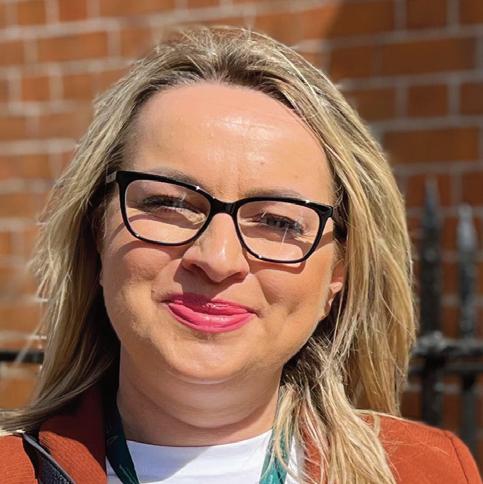

Originally from Poland, Agnieszka (Aga) Bates moved to Ireland in 2006. She completed a degree in banking before joining the Probation Service as a clerical officer in 2018, and later moving to the International Protection Office in 2023. When recruitment for the new grade of probation assistant opened in 2023, Aga applied as she was excited about the opportunity to return to the Service and work in a more hands-on role.
Describe a typical day like in your role as a Probation Assistant?
No two days are the same. For example, in the office, I usually have supervision appointments and a range of administration duties. Outside the office, I work closely with our Community Based Organisations, linking in with our female clients and developing supports for them; other days I might have court duties. A significant part of my day involves linking in with homeless services, keeping in regular contact with our clients. I also help my senior probation officer (SPO) with administrative duties, so it is very much a complementary role and one full of potential, room for growth and delivering positive outcomes for our clients.
Speaking to eolas Magazine following her recent contribution to the Public Services 2024 Conference, Executive Director for Strategy and Transformation at An Garda Síochána, Eimear Bourke, highlights how service transformation is crucial in providing a better policing service to the communities and the people of Ireland.

Bourke outlines that An Garda Síochána has undergone a period of significant transformation to its services, structures and ways of working in recent years. The underlining principle of this process, she says, has been the need to prioritise and support frontline gardaí in delivering effective services in communities. Given the inherent unpredictability of policing demand, Bourke says that delivering and realising the benefits of change within An Garda Síochána “means we need to apply two lenses; operational flexibility and long-term improvement”.
With over 17,000 personnel, including 14,000 gardaí, An Garda Síochána operates an extensive network of approximately 560 stations, supported by a €2.3 billion budget. “What makes us unique from other policing agencies is that we cover both policing and national security,” the Executive Director for Strategy and Transformation observes. The transformation journey over the past five years, driven by the A Policing Service for the Future implementation plan, has focused on supporting frontline service through new operating structures, leveraging new technology, enhancing governance, and fostering specialised supports. This includes:
shifting from a district to a divisional model; increased focus on community policing; and having centralised business services supports in every Garda division.
“Greater accountability around what we do and the decisions that we make is important to communities and people having trust in what we do,” Bourke indicates.
And as noted in the latest Garda Public Attitudes Survey of 2022, there is a high level of public trust in An Garda Síochána with 90 per cent of those surveyed viewing the organisation as fair and respectful. That trust, Bourke emphasises, is critical in shaping strategies.
“Public perception feeds into our three-year strategy and planning, but also it helps us in terms of how we allocate resources and decisions that we make on an operational basis,” she says.
In shaping strategy Bourke reflects on Ireland’s changing context, which is marked by global challenges such as climate change, migration, and cyber-enabled crime, outlines the importance of a collaborative approach. In this context, she notes An Garda Síochána works closely with government
“We need to be sophisticated, leverage technologies and upskill our people to tackle the changing natures of crime.”
Eimear
departments and community organisations to collaboratively tackle issues ranging from road safety to crime.
“The nature of crime is consistently changing. The definition of crime 20 years ago is very different to today, with economic and cyber related crime cited as examples where An Garda Síochána have adapted and grown specialist skills and capabilities to prevent and investigate such crime types.
“Technological advancements have also been pivotal. Alongside An Garda Síochána’s transformation programme, the ongoing delivery of a data and technology vision has seen significant investments in IT and data architecture, supporting enhanced information-led approaches to policing,” she says.
Under the active mobility programme, for example, every Garda member now has a mobile device equipped with custom policing apps that allow them to spend less time in stations, and more time working in communities.
These devices are proactively assisting gardaí in detecting crime while on frontline duties, for instance a new system now allows members of An Garda Síochána to quickly and easily identify uninsured vehicles while on the roadside by checking its registration on a Garda Mobility App.
Furthermore, the launch of a proof of concept for body worn cameras, and the supporting Digital Evidence Management System (DEMS), at stations in Dublin and Limerick city marks another step forward for An Garda Síochána towards the implementation of information-led policing.
There are now four stations and 500 trained gardaí using body worn cameras. Their benefits are already being seen with feedback suggesting they have directly led to the de-escalation of situations which might ordinarily escalate.
The ability of An Garda Síochána to securely acquire and process digital evidence is a key feature of modern policing. And the use of body worn cameras, supported by the underlying legislation, technology and training, acts as an important evidentiary tool.
Bourke highlights that further advances have been made in service delivery following the introduction of the GardaSAFE computer aided dispatch system. This has seen a significant upgrade in emergency response and dispatch technology, managed through four new regional command and control centres.
“This means that we can make real-time decisions on how we prioritise calls, how we allocate resources, making sure that resources are sent to a particular call, and they have got the right skills and right equipment. Therefore, it means that when a garda goes to a particular call, they have all the information they need,” Bourke underlines.
Beyond this she also highlights the importance of adapting and expanding the skillsets and expertise of personnel within An Garda Síochána.
The Executive Director for Strategy and Transformation outlines the importance of investing in people. One of the key benefits of An Garda Síochána’s new

divisional operating model, she says, is that it has allowed the redeployment of gardaí from administrative to policing roles. This has been supported by a significant increase in the size and skill profile of An Garda Síochána’s civilian workforce.

However, in a competitive recruitment landscape, Bourke says that An Garda Síochána recognises the need to balance new recruitment with the retention and career development of its existing workforce, who possess extensive organisational knowledge and experience.
Significant changes have been made in personnel development, she outlined. With over 740 new Garda trainees and 530 new civilian staff joining in 2023, the focus has also been on health and wellbeing, mental health training, and in particular human rights education.
She outlines that in recent years, An Garda Síochána has put a significant emphasis on our role as the first line of defence of the human rights of all people we come into contact with.
“Human rights are central to every decision we make,” reflects Bourke, highlighting the integration of ethical considerations in policing through the Garda Code of Ethics.
She adds that the Garda Code of Ethics clearly states that policing must be carried out in a manner that is independent and impartial, that respects human rights, and that supports the proper and effective administration of justice.
As part of a range of measures to embed human rights, An Garda Síochána, in
“Human rights are central to every decision we make.”
that has been undertaken by more than 3,000 Garda personnel (*correct as of June 2024) with 1,000 more to take it in 2024.
Policing colleagues from the Federal Bureau of Investigation (FBI), the Drug Enforcement Administration (DEA), the United States Department of Homeland Security, the Belgian Federal Police, and the Tanzanian Police Force have also undertaken the course.
Summarising, Bourke asserts that An Garda Síochána’s mission of keeping people safe is “more relevant than ever in a rapidly changing Ireland”.
“We need to be sophisticated, leverage technologies and upskill our people to tackle the changing natures of crime. We are going to continue to focus on supporting our people by focusing on their professional development, along with their health and wellbeing. This is a huge opportunity, and it is exciting to see the impact of what that means. We want all of this to have a significant, positive impact on our all our people”.
“The ongoing commitment to community engagement, ethical policing and supporting our people will ensure that An Garda Síochána remains a trusted and effective policing service dedicated to serving communities and the people of Ireland,” she concludes.
These statistics have been compiled using data from the Courts Service, the Central Statistics Office (CSO), and An Garda Síochána.
• 547,445 new cases come before the courts in 2022
• 39% increase in new civil cases before the District Court since 2021
• 25% increase in cases before Central Criminal Court since 2019
• 15% increase in domestic violence applications coming to the courts since 2019
• Road traffic offences 24% reduction since 2019
• Drug offences 10% since 2019
• Sexual offences down 11% since 2019
• Larceny/robbery/fraud matters down 18% since 2019
Source: Courts Service, September 2023
Sexual offences down 12%
Homicide and related offences down 7%
Theft and related offences up 9%
Weapons and explosives offences up 10%
Robbery, extortion and hijacking offences up 18%
*Q1 2024-Q1 2023 comparison
Source: CSO, June 2024
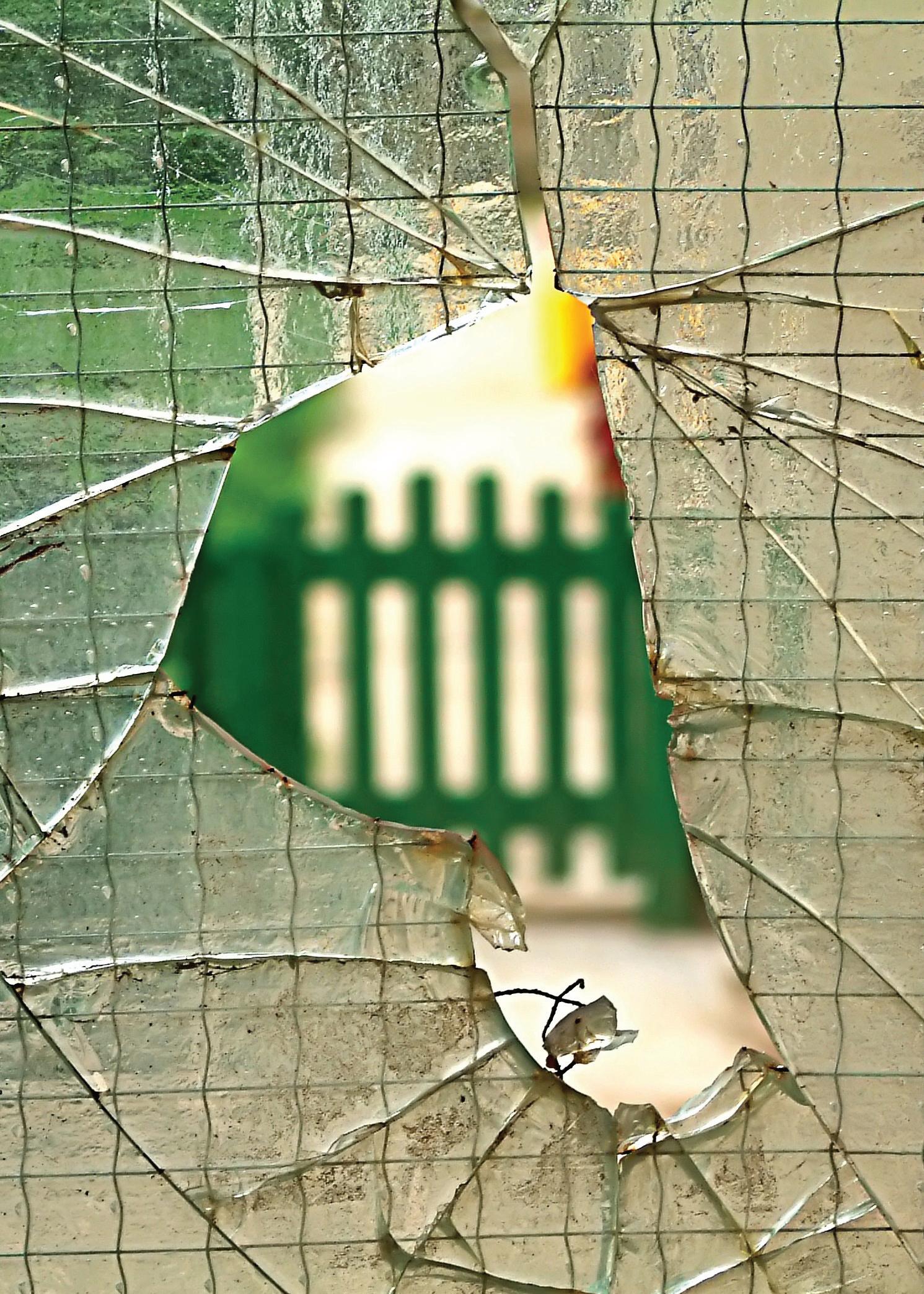
12% increase in the number of hate crimes and hate related (non-crime) incidents reported to An Garda Síochána compared to 2022
651 hate crimes and hate related (noncrime) incidents recorded in 2023
• 582 in 2022
548 hate crimes
• 510 in 2022
103 hate related (non-crime) incidents
• 72 in 2022
Source: CSO, June 2024

There

a
Across policing, justice and defence organisations, there is a growing trend in the establishment of transformation roles across senior leadership teams such as a head of transformation role, write Judith Crawford, EY Ireland Government and Public Sector Lead and Hannah de Burgh Whyte, Director, People Consulting, EY.

Previously under the remit of a chief strategy officer or chief technology officer, the standalone chief transformation officer is a sign of the need for a dedicated voice to ensure action and implementation of strategic change.
The vision for transformation needs to come from the top and there should be clear communication on why transformative change is needed, not just what needs to be done. These transformation roles, if used correctly, will be pivotal in bringing the change vision to life at all levels of the organisation and providing visible sponsorship.
Being transformative requires planning for now and the future. Organisations must consider foundational transformation rather than quick fixes and ad hoc investments to give them the ability to adapt. A refocus from the historical value drivers of scale, scope and efficiency to a new core of value creation – putting humans at the centre, deploying technology at speed and
driving innovation at scale – keeps organisations nimble and multidisciplined in a rapidly changing world.
There is no one straight path to the success of an organisation’s transformation. It is a systematic change that comes with its share of twists and turns. The key is to create a culture of experimentation, accept the non-linearity of it, and use technology to realise the transformation vision.
While every change journey is different, below are six “get rights” for transformation leaders based on EY’s experience of delivering major transformational and cultural change in policing, justice and defence over the past 10 years.
1. True leadership alignment
Secure senior leadership team alignment and buy in from the start – do not assume others support the change. Identify the appropriate senior sponsor for each individual transformation programme who will advocate the change and build awareness and understanding of the ‘why’.
“There is no one straight path to the success of an organisation’s transformation. It is a systematic change that comes with its share of twists and turns.”
Judith Crawford, EY Ireland Government and Public Sector Lead
Connect with management and staff
Middle managers set the tone on the ground but they are often the hardest to engage. Get buy in early to encourage them to lead from the front. Engage with key groups to shape, deliver and sustain the change. Understand the change from their perspective – ask, involve and observe. A clear engagement strategy will support reaching the target audience.
3. Analyse and personalise
Create a human centric approach to change – use data and insight to shape, tailor and drive the change journey. Avoid the ‘one size fits all’ pitfall, instead, identify hotspots to target interventions.
4. Think big, start small
Be ambitious and bold in your plans but always pilot and fine-tune to ensure you get it right. Agility is key. Execute quick wins to build confidence; people are more willing to invest their time in the ‘tried and tested’. Reinforce lessons and insights from pilots as well as from similar organisations to build confidence.
Create a compelling narrative
Make sure everyone understands the why, the benefits, and the ‘what is in it for me’. Translate the organisational benefits into what that means for people on the ground. Create a compelling narrative and explain it to the audience. Keep communications consistent and easy to understand and complement them with an easily identifiable brand and identity.
6. Make it stick
Upskill the organisation to enable sustaining the change post go-live. Avoid the ‘one and done’ mentality by creating real capability in the organisation to adopt the change. Measure success by tracking adoption of the behaviours needed to realise the programme’s intended value and be sure to reward and recognise positive behaviours.
Transformation leaders should consider what is needed from an operating model perspective, to ensure the critical elements are in place to help them
drive and achieve change. For example:
• Do I have the right structures and resources in place to deliver on the transformation agenda?
• Does the organisation have the maturity in programme management, change management and project management office skills to prioritise, plan, track and deliver key programmes?
• Is the governance model in place with the right people at the table to make decisions at pace and manage risk across the portfolio of transformation programmes?
• How will data be leveraged to ensure programmes are delivering value and intended benefits?
At a time when transformation is at the forefront of organisation agendas, leadership teams need to embrace the transformation leader, empowering them to drive change and get things done for the good of the organisation, its staff, and customers. Leading the change by giving focus to the six “get rights” and ensuring the right operating model is in place can help transformation leaders to achieve successful and sustainable transformation, while putting humans at the centre of transformation efforts.
To find out how EY can help you: W: www.ey.com/ie/consulting
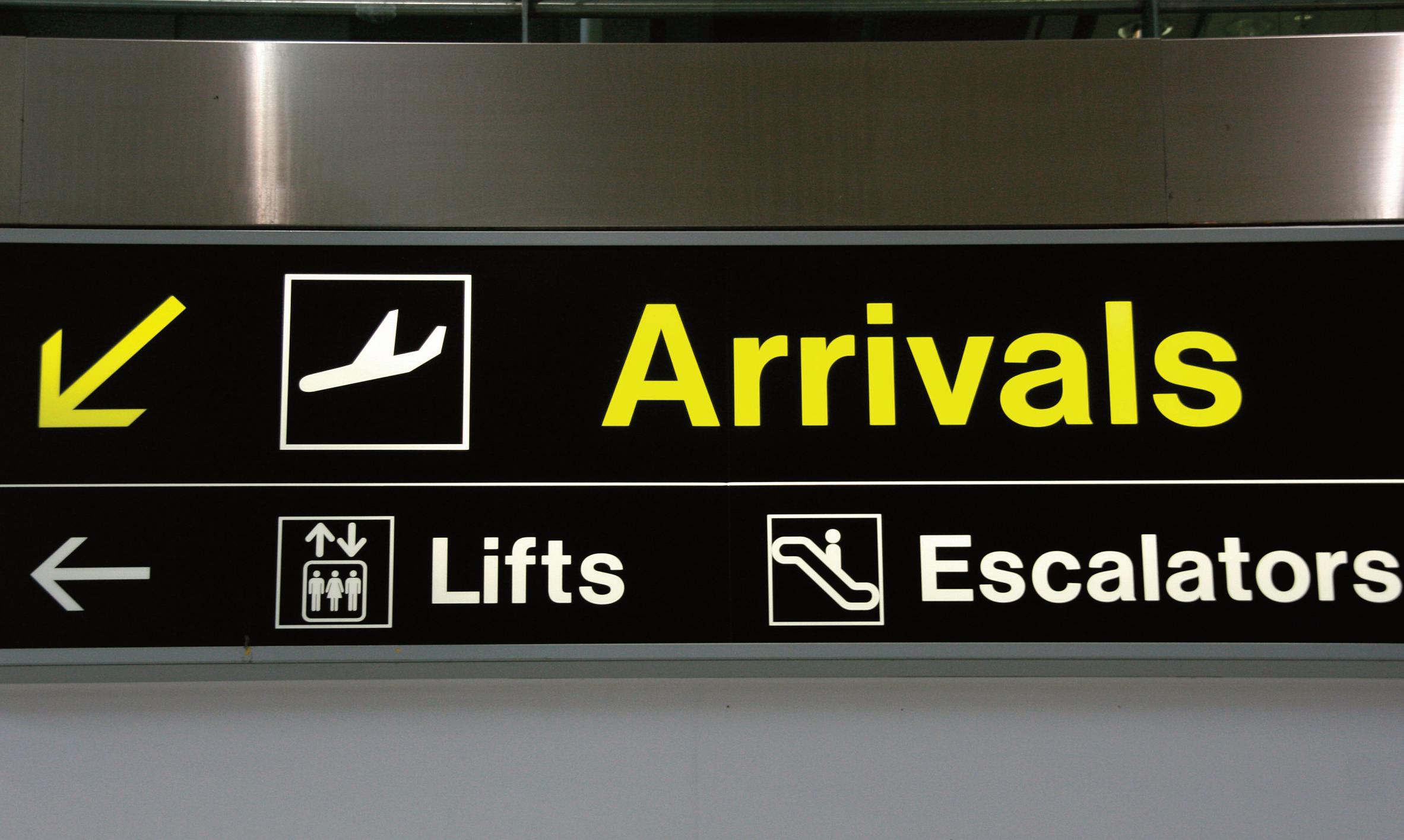
In July 2024, the State officially opted into the European Union’s common asylum and migration policy. eolas Magazine examines what this means for immigration rules in Ireland and the scale of immigration and asylum numbers.
Under the new rules, the European Union seeks to establish a “fair share” principle on the allocation of asylum seekers and refugees in the European Union, owing to stated claims by the Department of Justice that “some member states receive a disproportionate number of claimants in their territory”.
Under the “fair share” principle, the “solidarity” would be set at EU level, with member states contributing on the basis of a mandatory “fair share” principle which is based on a formula of 50 per cent population and 50 per cent GDP. Member states can then choose their preferred method of solidarity which could take the form of relocations or financial contributions.

Mandatory accelerated asylum processing for applicants who meet certain criteria, including instances in which they come from a third country with a low recognition rate for asylum across the Union or those who present without documentation will be introduced. This will mean that those who are not entitled to asylum will be, according to the Department of Justice, processed “swiftly”.
The Department of Justice states: “Accelerated asylum processing was introduced in Ireland when Minister McEntee signed regulations in November 2022 to commence the fast processing of applicants from designated safe countries of origin.”
The efficacy of these measures is disputed,

with the main opposition party, Sinn Féin stating that although there were 5,717 asylum applications refused, withdrawn or determined inadmissible in 2023, only 948 of people subject to these refusals were issued with deportation orders and 317 people are “confirmed to have left”.
Under the pact, the State is to be bound by the following legal obligations:
1. Reception Conditions Directive;
2. Qualification Regulation;
3. Asylum Procedure Regulation;
4. Resettlement Regulation;
5. Asylum and Migration Management Regulation;
6. Eurodac Regulation; and
7. Crisis and Force Majeure Regulation.
The Government is now required to transpose these new rules into practice under the Common Implementation Plan, adopted by the Commission on 12 June 2024. The implementation plan sets out actions required to translate the new migration rules into practice and must be adopted by December 2024.
The population of the European Union is an estimated 449 million, while the population of the State is estimated at just under 5.3 million.
According to Eurostat, in 2022, the EU granted protection status to 384,000 asylum seekers, up by 39 per cent compared with 2021 (275,000).
Meanwhile, 875,000 people applied for international protection in the EU countries for the first time. This is an increase of 63 per cent compared with 2021.
The EU countries that received the highest number of first-time applications in 2022 were Germany (218,000 or 25 per cent of all first-time asylum applications in the EU), France (138,000 or 16 per cent), followed by Spain (116,000 or 13 per cent), Austria (110,000 or 13 per cent), and Italy (77,000 or 9 per cent). These five countries together accounted for 75 per cent of all first-time asylum applications in the EU.
Compared with the population of each EU country, the highest rate of first-time applicants in 2022 was recorded in Cyprus (24,000 applicants per one million people), ahead of Austria (12,000) and Luxembourg (4,000). By contrast, the lowest rate was observed in Slovakia (90 per one million people) and Hungary (five per one million people).
Eurostat records 13,645 first-time asylum applicants in Ireland in 2022, up from 2,615 in 2021, marking a yearly increase of 589 per cent.
As a proportion of population, Ireland’s asylum application rate in 2022 was roughly 388 per one million people, based on CSO population estimates compared with the applicant numbers presented by Eurostat. This places Ireland well below some EU member states, and significantly below the UK, which, according to UK Home Office numbers, had 87,000 asylum seekers in 2023, meaning it has a presentation rate of roughly 1,298 per one million people.
In April 2024, Minister for Justice Helen McEntee TD reportedly told the Cabinet that 90 per cent of the State’s asylum seekers arrived via Northern Ireland, although there are no reliable statistics available.
In spite of this assessment, the Department did not comment on whether the claim that 90 per cent of the State’s asylum seekers arrived via Northern Ireland was verifiable. In a statement to eolas Magazine, the Department of Justice asserted: “The Department’s assessment, based on the experience of staff and others working in the field, and based on material gathered at interviews, is that in a significant proportion of cases those applying in the IPO [International protection Office] have entered over the land border.”
McEntee had previously claimed that the number of asylum seeks arriving via the North was 80 per cent, but this was disputed by Minister for Foreign Affairs Micheál Martin TD, who stated that McEntee’s numbers were based on presentations of refugees, but that the 80 per cent figure was “not statistical”.
Ireland’s asylum application numbers are at a record high, at least four-times higher than those presented during the Syrian refugee crisis of 2015, but they are not disproportionately high compared to those of other EU member states and are significantly lower than those of the UK.
Since Ireland is not a member of the EU Schengen Agreement, there is no automatic obligation for the State to participate in a common asylum policy, as it has an opt-in or opt-out clause on individual proposals in the areas of freedom, security and justice through the Lisbon Treaty.
Furthermore, the migration pact does not make any dispensation for Ireland’s special relationship with the UK, which includes freedom of movement between Ireland and the UK via the Common Travel Area, as well as an open border between the two jurisdictions in Ireland.
Therefore if, as Minister McEntee claims, there is a challenge in dealing with refugees arriving via Britain, it seems unlikely that signing up the EU’s centralised approach to dealing with asylum seekers will solve the challenge that is purportedly taking place.
The main aim of Accompaniment Support Services for Children (ASSC) is to provide support for all young people and their families as they negotiate their way through the criminal justice system in Ireland.
“Thank you for all the work you have done for me over this hard time, I could not have done this without you and your support is something I will always remember.”
“Thank you for all your support through this process. You are all amazing and we are very grateful for everything you have done for us.”
ASSC young person and family

ASSC operates a Forensic and Court Accompaniment Support Service and Advocacy service. This can be provided directly before, during and directly after the child’s time in the criminal justice system.
ASSC recognises the continued development of the rights of young victims of crime, now embedded in the
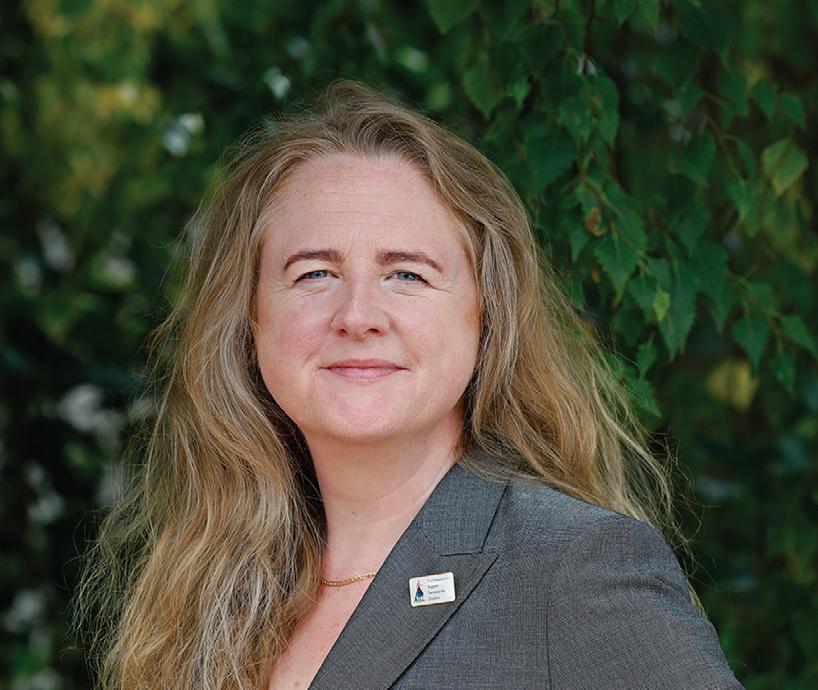
Criminal Justice (Victims of Crime) Act 2017.
ASSC wishes to promote a cultural shift in the development of “child-friendly justice” by providing essential services for child victims of crime. ASSC looks forward to our ongoing partnership with the Department of Justice, and now the new statutory agency Cuan, in supporting


this journey of delivering indispensable support for young people and their families.
ASSC is a not-for-profit charitable organisation set up in 2020 to address the needs of young people as they negotiate their way through the criminal justice system.
ASSC began to secure funding for its services from the Department of Justice in mid-2020. This was due to services being shut down within CARI (Children at Risk in Ireland). Funding was secured in early 2021 (during the peak of Covid-19), which allowed ASSC services to children to begin in early 2021.
Many other professionals support this journey. ASSC acknowledges the hard work of many NGOs and government agencies. We welcome their ongoing support, collaboration and guidance since our establishment in 2020.
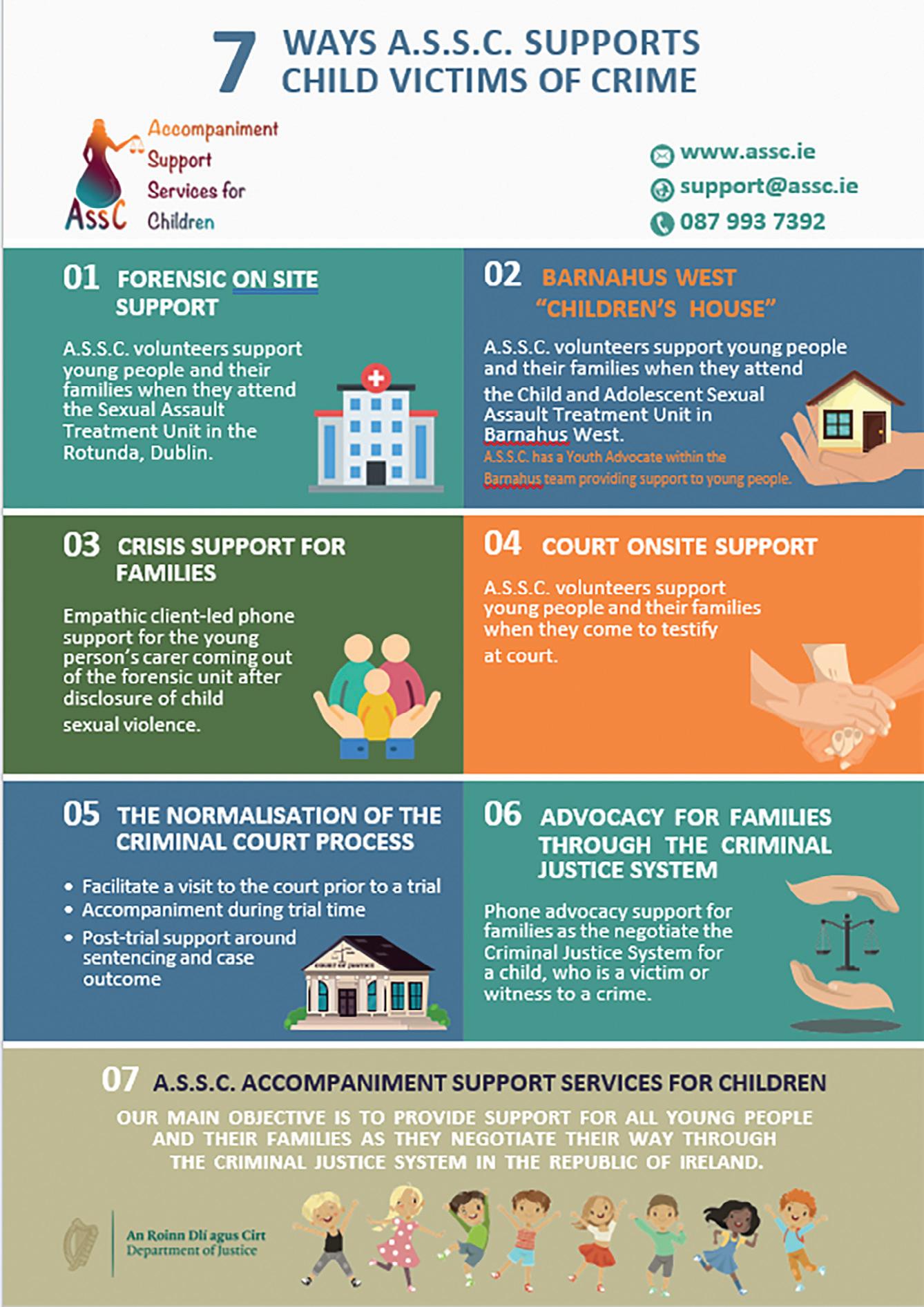
ASSC’s vision is a child-friendly justice system throughout the country that supports and gives a voice to all child victims of crime and witnesses to crime, along with their families, regardless of means, race, ethnicity, ability, gender, sexual orientation, religion, age or location.
ASSC recognises the significant value of effective multi-disciplinary work in providing services to children and young people who are victims of crime or have witnessed crime. We value collaboration with all stakeholders, within the criminal justice system.
ASSC provides three core services: forensic accompaniment, court accompaniment; and support and advocacy.
1. Forensic accompaniment
Onsite support is provided and led by ASSC volunteers. This is provided at two sites
- Sexual Assault Treatment Unit (SATU), Rotunda Hospital, County Dublin
- Child Adolescent Sexual Assault Treatment Services (CASATS), Barnahus West, County Galway
2. Court accompaniment
Nationwide service providing onsite support for young people and families preparing to testify as a victim and witness to any crime:
- ongoing support and advocacy (collaboration with stakeholders key here for family);
- pre-trial meeting ( collaboration encouraged) – key work done with young person and family at this stage;
- DVD accompaniment;
- trial accompaniment – Volunteer-led (supported by staff);
- post-trial support for young people and family;
- sentencing accompaniment; and
- appeals support if applicable.
3. Support and advocacy:
- forensic support and advocacy: Crisis support and advocacy provided to families coming out of the forensic/medical examination units;
- court support and advocacy – Ongoing support and advocacy are provided to families for young people preparing to testify in any criminal trial or hearing;
- ongoing Support and Advocacy –Ongoing support and advocacy are provided to families for young people engaged in the criminal justice system (outside of the forensic and court pathways); and
- ASSC youth advocate – EU Pilot role within Barnahus West. The youth advocate works directly with young people engaged in Barnahus West. This role aims to bring the child’s voice to the multidisciplinary table to facilitate child participation.
Steps forward for the charity include continuing with the national expansion, setting up social media platforms, child participation and research. This will allow ASSC to continue to reach more young people and allowing the voice and experiences of young victims of crime to be advocated for.
Most importantly, we commend the bravery, resilience, and determination of the young people who step forward, breaking the silence. Their courage has provided a path for future child victims of crime to come forward and be heard. We also recognise the families and carers who support and stand beside those young people on this challenging and unpredictable journey through the criminal justice system in Ireland.
For more information: E: support@assc.ie W: www.assc.ie/support-from-assc
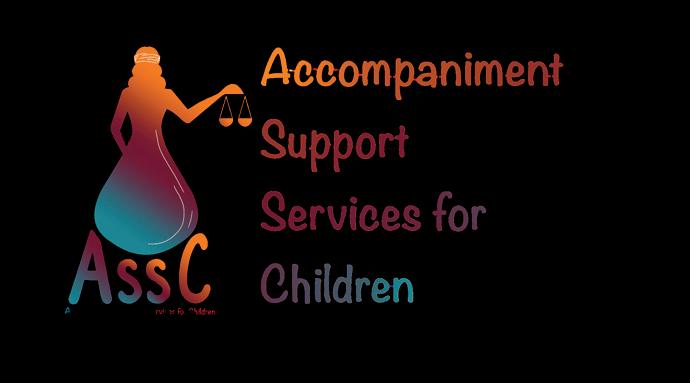

The Courts Service continues to introduce digitally enabled services, make evidence-based decisions to transform how we interact with our users, and streamline ways of working.
In implementing greater digitalisation as per our 10-year Modernisation Programme, we are transforming day-today operations across the Courts Service, improving the user experience, and ultimately providing Ireland with a modern, high performing courts system.
We have made significant advancements in our data capabilities, which are driving better ways of working across the Courts Service. The implementation of a comprehensive data dictionary has been pivotal in standardising counting rules across our diverse operations, ensuring consistency and accuracy.
Our focus on the importance of datadriven decisions has provided momentum for the development of a range of management dashboards
across multiple areas of work. Data dashboards are available for court sittings, wait times, probate, jury, and video court utilisation, among others. All data reporting is now launched from a new single reporting portal accessible by management and will expand over 2024 and beyond.
Improved data availability, reliability, and quality also supports the objectives detailed in the Judicial Planning Working Group recommendations. The Judicial Planning Working Group (JPWG) report, published in February 2023, recommended the appointment of 24 additional judges across the Courts.
To track the impact of the additional judges, a quarterly JPWG data impact report has been developed. This report ensures that key metrics used to measure the impact are captured, tracked, and shared throughout the
organisation, with the judiciary and beyond, promoting a data-driven culture.
These initiatives are central to our Modernisation Programme, demonstrating our commitment to support policy making and leveraging data for improved operational and strategic planning.
Earlier in 2024, we launched a pilot of our Open Data Portal, which is aimed at making data from the courts easily available and accessible. The launch of this portal highlights our commitment to open data, and to transparency and accessibility, and will facilitate a better use of courts data. The portal is now live at data.courts.ie and is a useful resource for staff, and members of the public.
The portal takes the data from our annual reports and presents it in a simple, straightforward manner and uses graphic tools to look at trends and patterns. The figures on the portal are also available to download for reuse, in line with open-data principles.
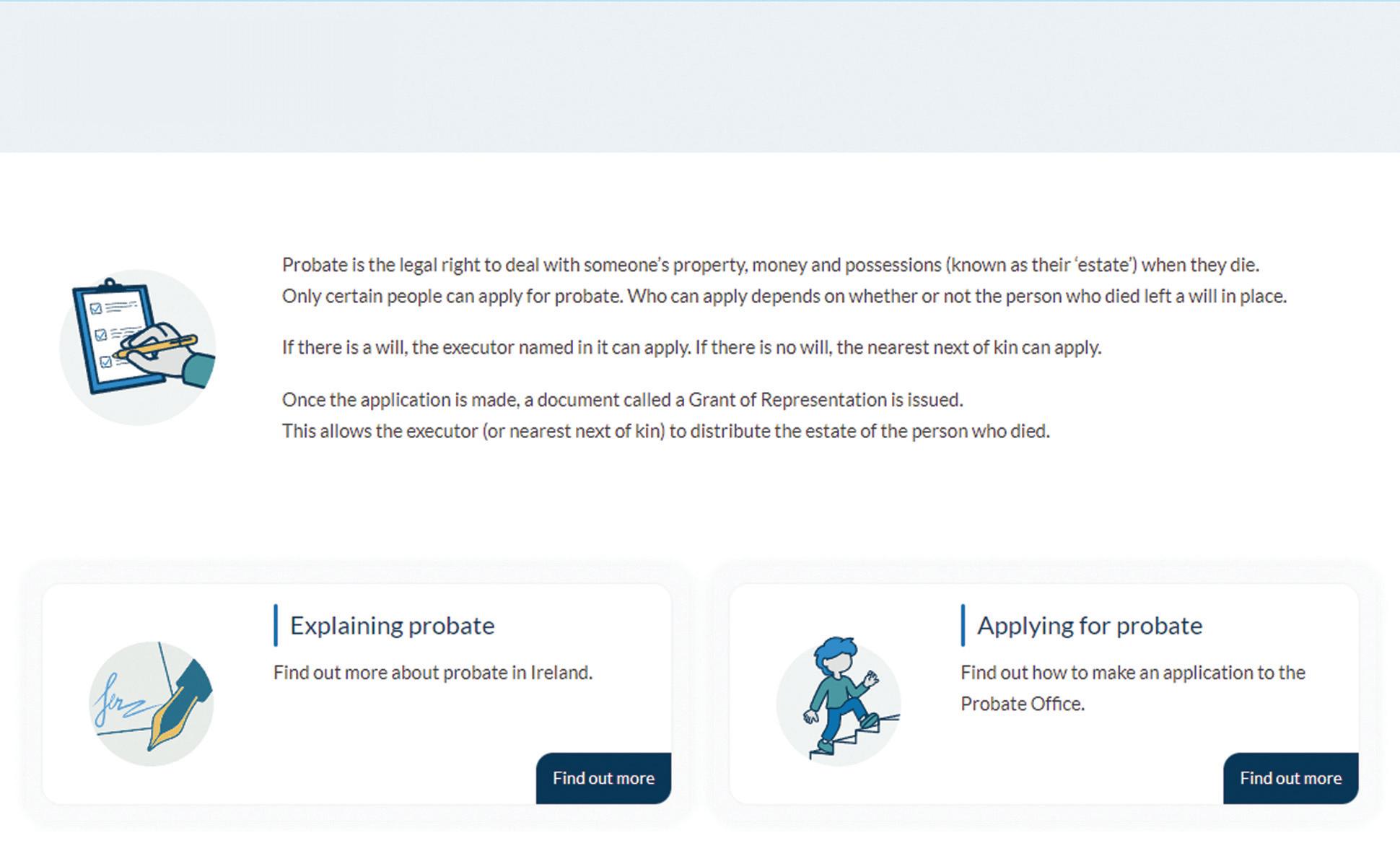
Probate is the legal right to deal with someone’s property, money and possessions (known as their ‘estate’) when they die. Only certain people can apply for probate. Who can apply depends on wether or not the person who died left a will in place.
If there is a will, the executor named in it can apply. If there is no will, the nearest next of kin can apply.
Once the application is made, a document called a Grant of Representation is issued. This allows the executor (or the nearest next of kin) to distribute the estate of the person who died.
Explaining probate
Find out more about probate in Ireland.
Angela Denning, CEO, describes the portal as “a key step” in providing better access to, and a better understanding of, courts data.

“The portal takes the data from our annual reports and presents it in a simple, straightforward manner. It includes data from all our courts – from the District Court right up to the Supreme Court – and is designed to show key statistics, highlight trends and patterns with data, and make the data available for reuse.”
Angela Denning, Chief Executive Officer, Courts Service
We reached a very significant milestone in 2023 when we introduced our transformational Unified Case Management System (UCMS) to several business areas. This is a significant step for the Courts Service as part of our 10year Modernisation Programme.
Since 2021, we have been working to bring new digital technology and modern ways of working to the administration of justice, making access to justice easier and quicker to navigate, better responding to the needs of court users.
One of the main goals of UCMS is to unify the IT systems used by staff across different offices. UCMS is replacing many legacy systems with a single modern user-friendly system that looks and feels the same for all staff, regardless of their region or jurisdiction.
This will enable faster and smoother case processing, as well as improved data quality and security. It will provide a coherence to the way we operate and how we gather data to feed into our decision-making. From an end-user perspective, this case management system will be capable of supporting electronic filings, payments, order collection, case tracking and other related services via an online portal.
UCMS was rolled out to the High Court in October 2023, when 85 staff switched to using the new system. A phased rollout in Circuit Court offices is underway with the aim of having UCMS operational for all Circuit Family activity by Q3 2024. The UCMS solution has also supported the administration associated of the Assisted Decision-Making (Capacity) Act 2015, since commencement in April 2023. UCMS brings several benefits to staff managing cases, such as improved digital record-keeping, bulk actions, prepopulated order templates, validation for data entry, and automatically generated statistics and reports. Overall, staff have found UCMS to be an intuitive and accessible system that enables clear and accurate records.
Applying for probate
Find out how to make an application to the probate office.
Building on the improvements to our website, which includes information about family law and civil debt, we have also reviewed and refreshed content relating to probate.
We continue to take a user-centric approach and engaged with personal applicants and practitioners to develop content that is clear, easy to understand, accurate and meets the needs of all those who interact with the probate process.
The content is easy for both legal practitioners and personal applicants to understand the steps involved in the process, what information they will need to provide each step of the way and what they can expect from us. We also have a new feature which enables people to check in advance if they are entitled to apply for probate. This content is available on courts.ie.
For more information on the Courts Service visit www.courts.ie
In Gaeilge, ‘cuan’ means a haven, a port, or a harbour. It is also the shorthand name given to An Ghníomhaireacht um Fhoréigean Baile, Gnéasach agus Inscnebhunaithe, the new domestic, sexual and gender-based violence (DSGBV) statutory agency under the auspices of the Department of Justice.



Established on 1 January 2024 under Domestic, Sexual and Gender-Based Violence Agency Act 2023, which was signed into law by the President on 28 November 2023, Cuan has five primary functions:
1. delivering services for DSGBV victims, including the provision of safe and accessible accommodation;
2. establishing national service and governance standards;
3. informing DSGBV policy through its leadership on research and collaboration with other bodies such as the CSO;
4. delivering campaigns intended to both enhance awareness of the available supports and reduce the incidence of DSGBV; and
5. coordinating the actions established in the Third National Strategy on Domestic, Sexual and GenderBased Violence and reporting progress to the Justice Minister.
These functions, the Department of Justice states, were “codesigned with the sector” to ensure that it is equipped with the necessary mandate, responsibilities, and supports. In 2024, the agency has a budget of around €59 million. €47 million is allocated to the services and supports, while the balance is committed to awareness raising initiatives.
On 23 February 2024, Minister for Justice Helen McEntee TD formally opened Cuan alongside the Minister for Children, Equality, Disability, Integration and Youth, Roderic O’Gorman TD, and Minister of State with special responsibility for International Law, Law Reform and Youth Justice, James Browne TD, and announced the appointment of its inaugural CEO, Stephanie O’Keeffe.
“The establishment of a dedicated statutory DSGBV agency has been a priority of mine,” McEntee said, adding: “In designing and delivering Cuan, government and NGOs have come together in collaboration and
commitment. We have seen all political parties support the legislation to establish it, and we have seen unprecedented understanding and support for this work across society.”
Bringing together staff from Tusla – The Child and Family Agency, Department of Children, Equality, Disability, Integration and Youth, and the Department of Justice, Cuan aims to increase cohesion in the provision of DSGBV supports and services.
Appointed following open competition conducted by the Public Appointment Service, Stephanie O’Keeffe, a former National Director of Operations Planning with the Health Service Executive (HSE), became the first CEO of Cuan.
Prior to this, she was the HSE’s National Director of Health and Wellbeing tasked with delivering Healthy Ireland and has more than 20 years of experience across several public service organisations.
Paying tribute to O’Keeffe upon her appointment, McEntee said: “I am delighted that someone of the calibre and experience of Stephanie O’Keeffe, will now take on the task of running the agency. Given her extensive experience of nationwide service delivery, building new and robust teams, and driving forward ambitious whole of government priorities, I am confident this leadership is exactly what Cuan needs, in its formative years.”
Seconded for a five-year term, O’Keeffe acknowledged the challenges of delivering Zero Tolerance, the Government's third national DSGBV strategy, committing Cuan to becoming “a driving force... to build a national movement”.
Thanking McEntee for entrusting her with the task, O’Keeffe said: “My work now is to establish our team and the functions of the new Agency, from research and policy coordination to awareness raising and driving delivery of safe and accessible support services including refuge accommodation.”

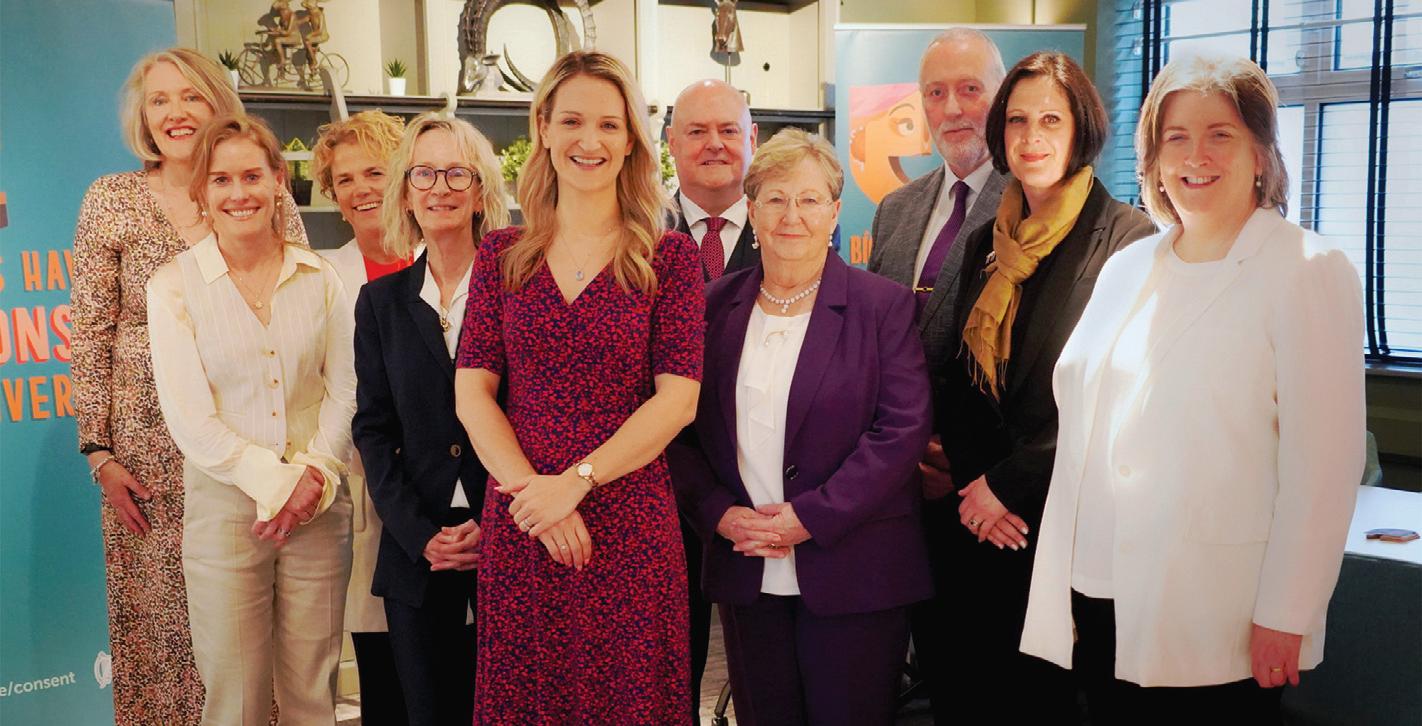
Comprising a chair and six members, the board of Cuan was appointed by and reports to the Minister for Justice. Following an open competition process with state Boards, the inaugural board members are:
• Caroline Fennell (Chair)
Professor emerita of law at University College Cork, Fennell is currently a Commissioner of An Coimisiún Toghcháin having previously served as a Commissioner of the Irish Human Rights and Equality Commission from 2018 to 2023.
• Sarah Benson
Before becoming CEO of Women’s Aid – a position she has held since 2019 –Benson was the CEO of Ruhama, a Dublin-based NGO that works nationally to support women affected by prostitution and other forms of commercial sexual exploitation.
• Molly Buckley
A public health nurse, Buckley has extensive experience in community development and family support services and is a founder of the Offaly Domestic Violence Support Service (ODVSS) which she has chaired for 20 years.
• Denise Charlton
Currently, Charlton is the CEO of Community Foundation Ireland. Previously, she was CEO of the Immigrant Council of Ireland and a Director with Women’s Aid.
• Vivian Geiran
A social worker by profession and an adjunct assistant professor and lecturer on the bachelor in social studies and master in social work programmes at Trinity College Dublin, Geiran served as the Director of the Probation Service from 2012 to 2020.
• Conor Hanly
Currently a lecturer and assistant professor of law at the University of Galway, Hanly also sits on the board of the Galway Rape Crisis Centre.
• Claire Loftus
Having served for 10 years as the Director of Public Prosecutions, Loftus is a retired public servant and a solicitor.
Effective from 4 April 2024, the above were appointed for a period of between three and four years.
The functions of the board include:
• providing strategic direction to Cuan;
• promoting a high standard of corporate governance;
• advising and making recommendations to the Minister in relation to policies impacting the functions of Cuan; and
• adopting an annual report.
Remarking on the appointment of the board, the Justice Minister observed: “I am delighted that people with such experience and knowledge have been appointed to the board. In supporting Cuan to deliver on its functions, their commitment and contribution will be a key element to driving real and positive change for victims and survivors and for society more broadly... I am confident that they will guide Cuan wisely as it continues to develop and implement innovative approaches to preventing DSGBV, supporting victims and survivors, and promoting awareness and education.”